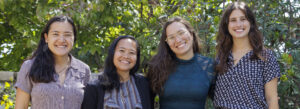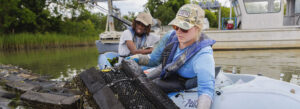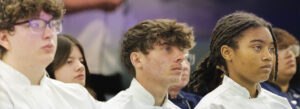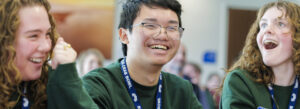VA SEA brings ocean research to classrooms
In classrooms throughout Virginia, students get hands-on experience with concepts like marine parasites and genetic sequencing—and then break for lunch.
These activities use real data graphs and research tools, made suitable for middle school and high school learning through the VA SEA program, the scientists and educators alliance that translates graduate research into classroom activities.
The VA SEA program allows graduate students to build a lesson plan based on their research. The “alliance” benefits both parties—graduate students get a glimpse into classroom education and a chance for creative science communication. In turn, educators get a chance to incorporate ongoing research into engaging classroom activities.
With a little creativity, ocean science concepts can be worked into a variety of subject areas, like using oyster management as an example of policy. Lesson plans are tailored to address Virginia’s standards of learning that dictate the concepts taught at different grade levels.
“I love having those resources, especially because I was new to science,” says Rhonda Lowe Taylor, a fifth grade science teacher. “My philosophy is that these standards are not a ceiling, they’re a floor. There’s nothing in my standards that talk about ocean acidification, but they do mention something like human impact.”
Translating high-level concepts for middle schoolers or high schoolers can be challenging. That’s why VA SEA partners from the Chesapeake Bay National Estuarine Research Reserve (CBNERR) and the Marine Advisory Program at the Virginia Institute of Marine Science (VIMS) work with the graduate students to develop lesson plans.
“They come up with some great ways for explaining their research, and having the students even doing a mini-version of the same kind of research that they’re doing in the lab,” says Lisa Lawrence, the marine education program leader for MAP. “They’re very creative, and they come up with things that we wouldn’t necessarily have thought of.”
Hands-on learning helps students remember concepts, but there are practical aspects that make a good lesson plan, too—like choosing common classroom materials that are easy to set up or reuse during back-to-back class periods.
Teachers provide guidance and tips for the graduate students during the VA SEA fall workshop. Then, the graduate researchers develop their lesson plan, local teachers test-run the activity in their classroom, and the graduate researchers adjust their lesson plans based on teacher feedback.
“I added an interactive component to my lesson plan,” says Taylor Goelz, one of the VA SEA graduate students. “I also had to think back about what words they would know, what concepts they would know at that grade level.”
The lesson plans also introduce marine science as a potential career path, especially since the researchers designing the lesson plans aren’t that much older than the kids using them.
“Students are much more engaged with it than something that’s just out of a textbook or a science lab book,” Lawrence says. “They really like that real-world connection.”
The VA SEA activities give students the chance to pose questions, investigate, and experience the challenges and rewards of science—just like researchers.
Shoppers likely won’t find skates in U.S. grocery stores or restaurants, because most that are caught are used as bait for lobster pots or exported to Europe or Asia.
VA SEA lesson plans are available to view and download here.
Takeaways:
- The VA SEA program translates ocean science research into lesson plans for middle school and high school students.
- The program gives graduate students practice in science communication while bringing high-level science to classrooms.
- The VA SEA lesson plan expo allows teachers to connect with the graduate students and learn about their lesson plans and research.
Photos and video by Aileen Devlin | Virginia Sea Grant
Story by Madeleine Jepsen | Virginia Sea Grant
Published April 29, 2019.
The activities use real data graphs and research tools, made suitable for middle schoolers and high school learning through the VA SEA program.




